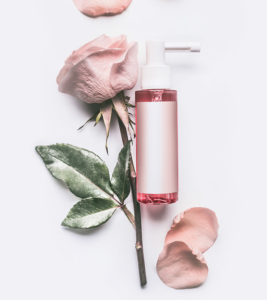Rosewater has been valued for its fragrance since the ancient times. The fragrance is said to have a calming effect on mind and induces relaxation, giving a sense of well-being. As far as the beauty industry is concerned, its importance is due to its many beauty enhancing and healing properties. While formulating products, it can be easily combined with other extracts like sandalwood khus, neem, tulsi, lemon and many others.
Rosewater has several properties. It is one of the most powerful skin toners. It not only tones the skin but the capillaries too. It improves blood circulation to the skin surface. Rosewater is said to contain vitamins A, C, D. E and B3. The best part is that it suits all skin types, including sensitive skin and even in acne conditions. Rosewater-based skin tonics have helped to improve skin texture and reduce skin congestion. This helps in oily skin conditions. They help soothe acne prone and rashy skin.
Rosewater can be used to complete the skin cleansing process. After using cleansing cream and gel, wipe the skin with rosewater, using cotton wool. It removes the last traces of cleanser and other residues and leaves the skin fresh and clean. It helps improve skin texture and close the pores.

Due to its cooling effect, rosewater is ideal for Indian summers as a skin freshener. It can be used several times during the day to wipe the face and remove the surface film of dirt, oil and stale sweat. In fact, it helps hydrate the skin and restore the normal pH balance. It has such a gentle action that it can be used to rejuvenate the area around the eyes. Cotton wool pads, soaked in rosewater, can be used over the eyes, like eye pads to remove fatigue and brighten the eyes. It helps reduce puffiness. Rosewater can be added to face masks when mixed at home. It mixes well with most other ingredients used in homemade masks like honey, yogurt, oatmeal, Fuller’s Earth (Multani mitti), sandalwood paste, egg and so on. Pure rosewater is made by a process of distillation. Rosewater is made by a process of distillation. If you wish to make it at home, you can try an easy method.
Take an enamel or steel vessel and put rose petals in it. For one cup of firmly packed rose petals, pour over them two cups boiling water. Cover and let the petals steep in water till the liquid becomes cool. Strain the water and squeeze out liquid from the petals. Keep the rose water in an airtight jar in the fridge.
Home Care
Chill some rosewater in a bowl. Wipe the skin with cotton wool. Then pat the skin briskly. It tones the skin and helps keep it healthy and youthful. It is particularly refreshing during the summer and rainy season. For oily skin, add two-three drops of lemon juice to one tablespoon rose water. Dip cotton wool in it and use it to wipe the face. It will help remove the surface film of oil and stale sweat and leave you with a cool and fresh feeling. For normal to dry skin, add two-three drops of glycerin to one tablespoon rosewater and apply on the face. A few drops of rosewater can be added to sandalwood paste and applied on pimples, acne or boils, to soothe and cure. It helps reduce inflammation. Rose water can be added to face packs and scrubs. Ground almonds can be used with a little rose water as a facial scrub.